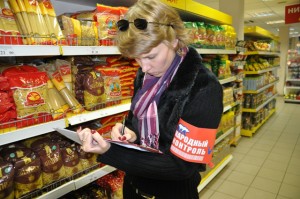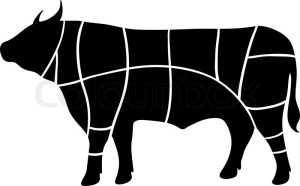
In late November 2015, Putin approved the transition of businesses to an electronic filing system. At the same time, the president invited all of those interested to assume the role of “people’s” tax collectors. According to Putin, consumers should have access to financial statements of all stores and restaurants in order to be able to check their receipts intended for tax purposes to see how any given business has accounted to tax authorities for any given sale or service rendered. “This will enable people, after they had a veal steak of good domestic quality for lunch, to check if that particular business–a restaurant or a cafe–that had sold them their meal accounted for the sold product appropriately or tried to pass it as a cheap buffalo steak. The same goes for all other products”, the Russian president declared. A new website called “Receipts inspection and storage service” was created for this purpose, along with new applications for iOS and Android.
The law on the compulsory use of online cash registers is supposed to come into effect in 2016, and will become obligatory for all, including individual entrepreneurs, by 2018. In order to encourage businesses to switch to online equipment faster, Putin offered them a tax rebate in the amount of about 20,000 rubles, which is the cost of a new-generation cash register.
By calling on people to personally control and catch businessmen red-handed, Kremlin once again recurs to the Soviet political tradition. Looking for domestic enemies while actively engaging in anti-American propaganda based on the image of a foreign enemy is a time-tested method of distracting citizens from the country’s topical issues. However, it is obvious that the transition to this new system cannot be solely explained by political considerations but by financial ones as well, which has even been recently noted by Russian Finance Minister Anton Siluanov. According to him, due to a decrease in oil price and a further slide of the ruble, the 2016 budget deficit might exceed the currently estimated 3 percent; consequently, the state will have to either considerably cut down spending or greatly increase collection of taxes. We will probably witness a combination of both.

It might seem that Putin could consider the former scenario politically risky, since he built his most recent “election” campaign on socially oriented issues. However, some analysts believe that it might actually be the other way around. According to political analyst Yekaterina Shulman, “Busy looking for cheap food, citizens will have no time for protests. The methods of suppressing local expressions of outrage like rebellions in single-industry cities have been tried and tested rather well, and TV propaganda will take care of the rest, representing price increases on laundry detergent as the result of Obama’s scheming”. Tax increases for businesses in the atmosphere of a deteriorating economic situation can hardly be seen as an ideal solution, but where else Kremlin can get money for maintaining the army, police, prisons and state-controlled media?
It is worth noting that only a year ago, in his 2014 address to the Federal Assembly, Putin spoke about the necessity to lighten the tax burden despite the Ukrainian crisis, the introduction of sanctions, and the acute fluctuations of the ruble’s exchange rate. However, last year, a sales tax was introduced, the threshold for insurance premiums was raised, property tax for entrepreneurs was increased, and a new system of taxation of heavy-goods vehicles dubbed “Plato” was implemented, which resulted in mass protests by truck drivers. Alexander Osipov, vice president of the “Business Russia” Association, declared that “entrepreneurs either abandon business altogether or withdraw ‘into the shadows'”. It cannot be ruled out that by 2018, the country will have more “people’s controllers” than entrepreneurs.





